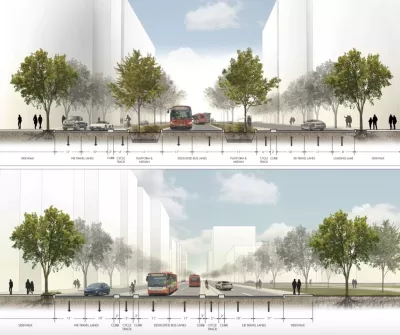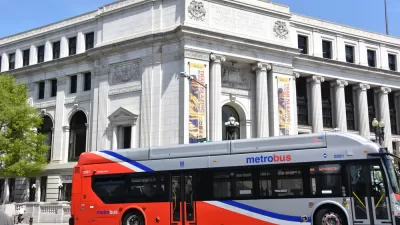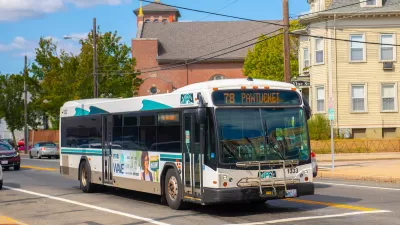When presented with a choice between investing in improved service or funding a fare-free program, the D.C. Council is choosing fare-free transit, and potentially overriding the wishes of the mayor.

D.C. Council members recently unveiled a budget plan that would fund for free Metrobus service in the District by diverting funding from the long-planned K Street Transitway.
According to a paywalled article by Justin George and Luz Lazo, “Council members are now proposing to pause the K Street Transitway — a project Bowser has touted for years — and shift money to Metro for D.C.”
“The proposal to shift money from one transit-focused project to another comes as cities across the country are grappling with changing commuter patterns more than three years into a pandemic that has boosted telework,” add George and Luzo.
If the free transit program is approved, the District would become the largest U.S. city to offer free transit—surpassing Kansas City for the title. Though the D.C. Council voted to approve the fare free program in December 2022, the program has been locked in a test of political wills between the council and D.C. Mayor Muriel Bowser.
George and Luzo offer more insight into how the latest funding plan for fare free transit in D.C. came to be:
“Funding for the bus program was slated to come from excess revenue D.C. had been expected to earn from taxes, but in an updated forecast, city finance officials said they didn’t expect the government to net enough for the $43 million program. Bowser didn’t include the project in her 2024 fiscal budget draft last month. But on Wednesday, council members said they found the alternate way to fund the program, using money from the $123 million transit way project they say is less critical than before the pandemic because of widespread telework, which has brought fewer workers downtown.
The political controversy in D.C. is a prominent example of an ongoing debate about the value of fare-free transit to ridership and service for struggling transit services around the country. A Planetizen opinion piece published in December, around the time of the D.C. Council’s approval of the fare-free transit program, provides additional insight into the give and take of free transit. The potential of the free transit to shelve the K Street Transitway presents the stakes of the debate in stark terms.
More information about the K Street Transitway project can be found on the District Department of Transportation website.
FULL STORY: D.C. Council weighs pausing K Street project to add free bus service

Maui's Vacation Rental Debate Turns Ugly
Verbal attacks, misinformation campaigns and fistfights plague a high-stakes debate to convert thousands of vacation rentals into long-term housing.

Planetizen Federal Action Tracker
A weekly monitor of how Trump’s orders and actions are impacting planners and planning in America.

Chicago’s Ghost Rails
Just beneath the surface of the modern city lie the remnants of its expansive early 20th-century streetcar system.

Bend, Oregon Zoning Reforms Prioritize Small-Scale Housing
The city altered its zoning code to allow multi-family housing and eliminated parking mandates citywide.

Amtrak Cutting Jobs, Funding to High-Speed Rail
The agency plans to cut 10 percent of its workforce and has confirmed it will not fund new high-speed rail projects.

LA Denies Basic Services to Unhoused Residents
The city has repeatedly failed to respond to requests for trash pickup at encampment sites, and eliminated a program that provided mobile showers and toilets.
Urban Design for Planners 1: Software Tools
This six-course series explores essential urban design concepts using open source software and equips planners with the tools they need to participate fully in the urban design process.
Planning for Universal Design
Learn the tools for implementing Universal Design in planning regulations.
planning NEXT
Appalachian Highlands Housing Partners
Mpact (founded as Rail~Volution)
City of Camden Redevelopment Agency
City of Astoria
City of Portland
City of Laramie





























